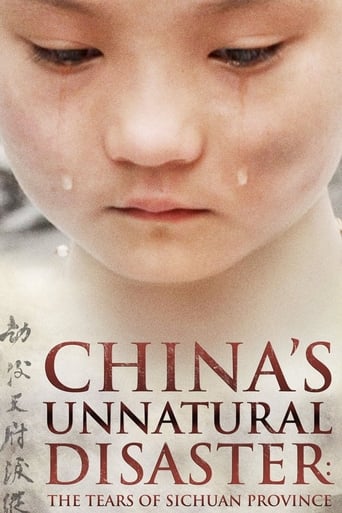GamerTab
That was an excellent one.
TrueHello
Fun premise, good actors, bad writing. This film seemed to have potential at the beginning but it quickly devolves into a trite action film. Ultimately it's very boring.
InformationRap
This is one of the few movies I've ever seen where the whole audience broke into spontaneous, loud applause a third of the way in.
Micah Lloyd
Excellent characters with emotional depth. My wife, daughter and granddaughter all enjoyed it...and me, too! Very good movie! You won't be disappointed.
Horst in Translation (filmreviews@web.de)
"China's Unnatural Disaster: The Tears of Sichuan Province" is a 38-minute live action documentary short film from 2009. It was directed by Jon Alpert and Matthew O'Neill and it was the first of two Oscar nominations for this duo. Here they lost to a music-themed documentary. It is an American production, but the entire thing was filmed in China and features only Chinese language, which is why you will need subtitles most likely. I personally believe that this was a very important documentary. It was made about a year after a devastating earthquake that killed thousand of Chinese. The focus here is on hundreds of children dying at school because the building collapsed and buried the young ones under the ruins. It is about the parents seeking answers why the schools were constructed in a way that it would not stand until the children are out, or at best not collapse at all. It is a very sensitive subject for everybody involved. We witness how the grieving parents are running against walls of bureaucracy, corruption and refusal to answer or really find out what happened. A really sad state of affairs. Another problem is that China has a very strict one-child policy because of the huge population, which means that most parents lost their only child during the tragedy. Of course, it is also very sad if you lose a child when you have 3 more children or so, but this policy made things even worse for many of them as one parent accurately described in the film as well. And totally aside from the contents, I already applaud this documentary because it's really rare we find out about life in China these days because it's just not the greatest place for American (or foreign, in general) filmmakers to work on documentaries. I read that this one here is forbidden in China because it is unpatriotic and I would not be surprised if it is true. The saddest moment of the film was probably when a mother was interviewed and she had to talk about how they had to carry her dead daughter with their bare hands because there was no opportunity to have official authorities bury her because of all the dead people. A touching little documentary that takes us into a world we are not used to seeing. I highly recommend the watch.
Indie Friendlie
We here at Indie Friendlie really liked this film, even though it was difficult to watch at times.The film follows the tragic deaths of children as a result of an earthquake in China. The real tragedy is that many of these fatalities were preventable.The cultural and political forces which contributed to this injustice are fascinating, and sometimes mind-boggling to Westerners.You'll get a rare glimpse into some of the harsher realities of Chinese culture, as well as empathize with the universal suffering all adults experience when they've lost a child.A well-made film.
evening1
One spring day in 2008, the 21st-strongest earthquake in history shook Szechuan Province in China, turning schools to rubble while inexplicably leaving surrounding buildings unscathed.Local authorities told traumatized parents they had to dig their children out on their own, so thousands of school kids died under the fallen bricks. When tearful parents examined the scene, they noticed signs of substandard construction, such as mortar on the bricks that was powdery instead of solid, and they demanded explanations from officials.This is the story of the parents' rage at being stonewalled by politicians who may have allowed the shoddy construction, did nothing to save children who got trapped, refused to investigate, and then finally tried to buy the survivors' silence. There are heartrending interviews with parents who had adhered to China's one-child policy, only to have these singletons claimed in the disaster.Included here is what may be rare footage of peasants confronting local functionaries and of the functionaries spewing paternalistic admonitions to avoid giving bad impressions of China to "our foreign friends." One is left feeling sorry for poor people who are left with nothing -- no children, no rights, no voice.Reading about this earthquake on Wikipedia I learned that China offered $8,000 to each family as a settlement -- on the condition they wouldn't speak publicly about their qualms. What a sorry situation.
cbholbrooke98
I loved this documentary because it was so candid and honest. It revolves around the aftermath of the massive 2008 earthquake in China that took the lives of thousands of people, many of them young children who were in unsound school buildings during the time of the tremor. Pictures of the lost and deceased children float in the hands of their parents throughout the film, who can been seen crying in almost every shot. The devastation and frustration felt by these families are heartbreakingly evident. Many lost their only child due to the OCP. I especially loved the part where some people were arguing over whether criticizing the standards for building structure safety in China was criticizing Red China as a whole, something everyone defended. I would recommend this to everyone, TiVo it next time it's on HBO, so long as you have tissues with you.

